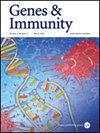Epigenetics behind CD8+ T cell activation and exhaustion
IF 4.5
3区 医学
Q1 GENETICS & HEREDITY
引用次数: 0
Abstract
CD8+ T cells play a critical role in specific immunity. In recent years, cell therapy has been emerging rapidly. The specific cytotoxic capabilities of these cells enable them to precisely identify and kill cells presenting specific antigens. This has demonstrated promise in the treatment of autoimmune diseases and cancers, with wide-ranging applications and value. However, in some diseases, such as tumors and chronic infections, T cells may adopt an exhausted phenotype, resulting in a loss of cytotoxicity and limiting their further application. Epigenetics plays a significant role in the differentiation and regulation of gene expression in cells. There is extensive evidence indicating that epigenetic remodeling plays an important role in T cell exhaustion. Therefore, further understanding its role in CD8+ T cell function can provide insights into the programmatic regulation of CD8+ T cells from a genetic perspective and overcome these diseases. We attempted to describe the relationship between the activation, function, and exhaustion mechanisms of CD8+ T cells, as well as epigenetics. This understanding makes it possible for us to address the aforementioned issues.

CD8+ T 细胞活化和衰竭背后的表观遗传学。
CD8+ T 细胞在特异性免疫中发挥着至关重要的作用。近年来,细胞疗法迅速兴起。这些细胞的特异性细胞毒性能力使其能够精确识别并杀死呈现特异性抗原的细胞。这在治疗自身免疫性疾病和癌症方面已显示出前景,具有广泛的应用和价值。然而,在某些疾病(如肿瘤和慢性感染)中,T 细胞可能会出现衰竭表型,从而丧失细胞毒性,限制其进一步应用。表观遗传学在细胞分化和基因表达调控方面发挥着重要作用。大量证据表明,表观遗传重塑在 T 细胞衰竭中发挥着重要作用。因此,进一步了解其在 CD8+ T 细胞功能中的作用,可以从遗传学角度深入了解 CD8+ T 细胞的程序调控,从而攻克这些疾病。我们试图描述 CD8+ T 细胞的激活、功能和衰竭机制以及表观遗传学之间的关系。这种理解使我们有可能解决上述问题。
本文章由计算机程序翻译,如有差异,请以英文原文为准。
求助全文
约1分钟内获得全文
求助全文
来源期刊

Genes and immunity
医学-免疫学
CiteScore
8.90
自引率
4.00%
发文量
28
审稿时长
6-12 weeks
期刊介绍:
Genes & Immunity emphasizes studies investigating how genetic, genomic and functional variations affect immune cells and the immune system, and associated processes in the regulation of health and disease. It further highlights articles on the transcriptional and posttranslational control of gene products involved in signaling pathways regulating immune cells, and protective and destructive immune responses.
 求助内容:
求助内容: 应助结果提醒方式:
应助结果提醒方式:


